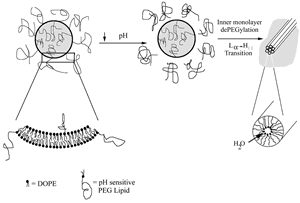David Thompson

- Professor | Organic Chemistry
- Email: davethom@purdue.edu
- Phone: 40386
- Office: 294 BIND
- Professor David Thompson's individual homepage
Liposomes that efficiently release their contents within the cytoplasm of target cells are of great interest for cell biology, pharmaceutical, and gene therapy applications. Unfortunately, the potencies of many liposome-based formulations are curtailed by inefficient escape of the encapsulated contents following target cell uptake.

We have developed plasma-stable liposomes that rapidly and efficiently release their contents from endosomal compartments. The acid-catalyzed and photooxidative cleavage reactions that greatly enhance membrane permeability in these systems have been used to deliver water-soluble drugs, photosensitizers, and plasmids to target cells. These results suggest that concurrent application of selective targeting and membrane translocation mechanisms in liposomal drug carriers can greatly increase their efficacy. Molecular design, synthesis, kinetic studies, and tissue culture techniques are employed in our efforts to develop novel materials that promote efficient liposome-cell membrane fusion and intracellular drug delivery.
New lipid membrane constructs are also under development in our laboratory as 1) templates for two-dimensional protein crystallization, 2) biomimetic energy transduction mechanisms using bolaamphiphile membrane vesicles containing vectorially-oriented gramicidin derivatives, 3) supported bilayer membrane sensors, and 4) cascade sensitizing agents for the formation of controlled-release polymer hydrogels.
Education
- B.S. & B.A., University of Missouri-Columbia, Chemistry & Biology, 1978
- Ph.D., Colorado State University, Organic Chemistry, 1984
- Postdoctoral Associate, Oregon Graduate Institute, Membrane Chemistry, 1987
Awards
- University Faculty Scholar, 2006
- Visiting Professor, Department of Biochemistry, University of British Columbia, 1992